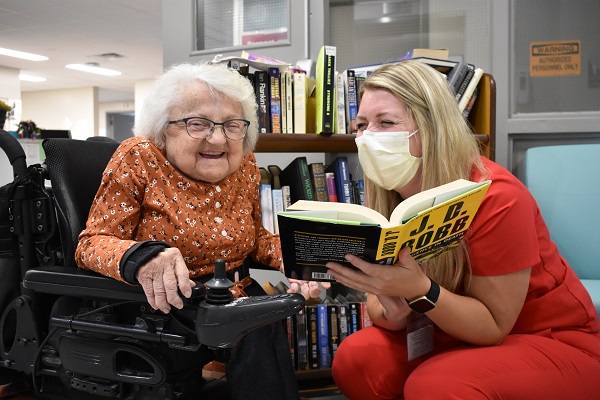By Jonna Semple-Kloke
Southeastern Ontario resident, 82-year-old Ada Groves, was unsure what her future would look like when she fell and broke her wrist last year.
After receiving acute care in nearby Kingston hospital she arrived at the newly opened Providence Transitional Care Centre (PTCC), a 64-bed, specialized, inpatient hospital, to rebuild her strength before returning home.
“The care is excellent,” says Ada Groves. “I didn’t even know this place existed before I arrived. I’m so happy I came here.”
Open since October 2021, PTCC provides restorative care, cognitive behavioral support, short-stay respite and convalescent care; services all under the umbrella of transitional care. The goal is to enhance the level of function in older, frail, adults while promoting and preserving wellness. All with a focus on transitioning patients home to the community when they are ready.
“Our goal is to help people remain in the community for as long as possible,” explains Darcy Woods-Fournier, Interim Vice President, Patient & Client Care and Chief Nursing Executive with Providence Care.
“When individuals come to PTCC for care, we develop a care plan based on their specific needs and help them with their activities of daily living, all while supporting their return to wellness as quickly as possible,” she adds.
In just over one year, the hospital is already making a significant difference in health care delivery and improving the overall patient experience. More than 65 per cent or 120 of the 234 patients admitted have returned to their homes, while 10 per cent have gone to long-term care, and some of the remaining have transferred to Providence Care Hospital for higher-intensity rehabilitation.
“The services and level-of-care provided at PTCC specifically address an identified gap that we had in Southeastern Ontario,” further explains Woods-Fournier. “With 77 per cent of patients coming from our local acute care provider Kingston Health Sciences Centre, we continue to work together to better coordinate care and improve outcomes for the people we serve.”
PTCC, with the help from its allied partners, is reducing the use and length of stay in regional hospitals and diverting admissions from the Emergency Department. The length of a patient’s stay varies depending on the type of care required, however on average last about 60 days.
For Ms. Groves, she says she is grateful for the compassionate staff, extra support and care she had while she recovered.
In most cases, upon discharge from PTCC patients receive community support and home-care once they return home, ensuring a successful transition. However now, the hospital has recently received additional Ministry of Health funding for a pilot program called the Providence Care Transitions Home Program, which will extend the PTCC allied health care team into the community, supporting the patient and caregiver from hospital to home.
“This new program means enhanced continuity of care,” says Woods-Fournier.
“The patients’ skills and confidence they’ve built up at PTCC will continue once they are home with a team they are already familiar and comfortable with; a team who knows and supports their unique journey,” she adds.
“We are bridging the gap in healthcare, alleviating the strain on regional hospitals, while helping older adults age well at home.”
The PTCC inter-professional care team taking part in the new pilot-program includes occupational therapists and assistants, physiotherapists and assistants, recreational therapists and behavioural therapists.
More patients, just like Ms. Groves, will now be able to benefit from familiar, extended support in the comfort of their own homes with a team they know and trust.
Jonna Semple-Kloke is a Communications Officer at Providence Care.


